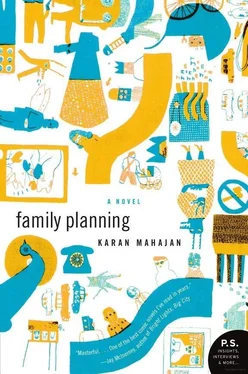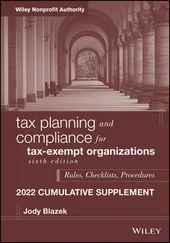“You’re too much, Rakesh,” she said. They’d been silent for a good twenty minutes and were slowing down by the mall.
“I know. I know,” he said. Then he grinned. “So are you.”
He also knew this was the end of the argument: she lay her hand on his; she had forgiven him; they were quits. Then Rashmi parallel-parked the car in a tight space on the narrow road with breathtaking skill and stepped out of the vehicle on the side of traffic and in doing so found herself in the direct path of a motorcyclist who had careened the wrong way down a one-way street; and with that, Rakesh’s time in America was over. The motorcyclist slammed straight into her and carried off in a whirling agglomeration not only Rashmi and three-fourths of the open door and a stack of magazines crammed into the driver-pouch but also managed to tilt (in the manner of water pushing open a sluice) the parked car away from the pavement so that Rakesh, who was stepping out from the passenger’s side at that very moment, was whooshed onto the ground, his head stunned by debris, his left eardrum punctured by a flake of glass, his palms bloodied by savage, cold concrete. The sun overhead was gorgeous and blinding and Rakesh sat up on the pavement and waited for someone or something to strike him down as well. Nothing happened; no one came for him. He was already struck down. The sun was maddening. For two hours he could make out nothing in the left ear, then the doctors worked a minor miracle and left him tolerably deaf. About Rashmi, though, nothing could be done. She had died on the spot.
It would be incorrect to say Rakesh stopped functioning: if anything, relatives said he took the death very well, as best he could have — what else could the poor boy do? He disavowed America and all the promise it supposedly represented (the motorcyclist had died, too, a month later, never waking from his coma) and flew back to India with his son. He started living with his parents again in their cavernous Greater Kailash house, Arjun left to the devices of his grandmother while Rakesh brimmed with rage and hurled himself into politics with a newfound fervor. He knew it wasn’t his parents’ fault that he had fallen in love with Rashmi, even if they had introduced them — but he blamed them nevertheless. He blamed them for his disastrous temperament. He blamed them for the sharp tongue that sent Rashmi shooting out the door and into the car. He blamed them for their inhospitality and bad cooking, for not keeping a home in India that would have tempted Rashmi to return. He blamed them for their legacy of bad luck that wasn’t bad enough: Why else had he survived?
Worse, he worried that his son’s life, Arjun’s life, would also be ruined by his mother’s disastrous ineptitude at child rearing: hadn’t she produced one failure already?
So, when his parents suggested a second marriage and Rakesh said yes, he did it with the irony and bitterness of a man who didn’t care. He did it because he was enraged that his parents could suggest remarriage this soon and because he wanted to spite them by marrying someone absolutely inappropriate. He did it for three-year-old Arjun. He did it because he wanted to be a politician, and politicians need wives. He refused to let his parents be the slightest bit involved and decided to go through the motions — the perusal of the classified ads, the screening of the bride-to-be, the uneasy conversations with the girl’s parents, the slightly ashamed call for dowry — purely for personal entertainment. But the girl was pretty, and personal entertainment soon gave way to a more primal lust when he drove to Dalhousie (alone) to see her. It was a traditional upper-class Himachali-landowner household — the food served on shiny silver platters — and he watched the girl carry nothing but her reflection on such a platter as she was ushered into the drawing room by her father. He ogled the tight curve of the girl’s breasts pushing up against the sari, the tautness of her exposed navel, the small coins of her ears.
To his parents, he only handed a wedding card.
“You’ve become American,” they said. “You’re only having one function. What will all your relatives think? We have to invite them. Please let us invite them. We’ve never heard of a son who won’t make us meet the bride before he’s married. You haven’t even shown us a picture of Asha. Don’t disgrace us.”
“Is that all you care about? Your disgrace? You waited only one month after Rashmi died to start telling me I should get remarried. Now I’m getting remarried. Just be happy.”
All the weeks till the wedding, he’d rise early in the morning to masturbate in the bathroom.
On the wedding day, though, seated next to him in the tent, minutes before they circled the fire, was a different girl, an ugly girl, a girl whose skin was coarse and whose features seemed to have been molded lazily from a single piece of dough, all flat and asymmetrical and stubborn, a toothy embarrassed smile on her face. He hadn’t noticed her face at first because it was obscured by various danglings of gold; then she quickly lifted her veil and frowned at him. Rakesh was utterly dazed. He thought: What if it is the same girl? But without makeup? How can I hurt her feelings? But no, she clearly wasn’t the same girl. This girl had no breasts. Rakesh knew he could have gotten up then, that moment, and put an end to the whole farce, he could have stood in the middle of the tent and kicked over the flames with the elegance of an enraged filmstar and asked no one in particular: What kind of nonsense is this? But he didn’t. Instead, Rakesh felt the eyes of his parents upon him — the layers of talcum powder shivering hideously on their skin like unlicked salt — and knew immediately that he would have to go through with the marriage.
After all, wasn’t he getting married to spite them? Would his mother and father really believe this was a different girl? Or would they think Rakesh had simply lost his cool at the last minute, reneging on the only real decision he’d made against their wishes?
He looked at the girl’s parents for a reaction— Were they her parents? The father was slouched eagerly with a hand massaging his knee; the mother was sitting up straight, her back against a pillar. Rakesh was overwhelmed by curiosity. Who was this new girl, this sudden bride? How did she and her “parents” think they could possibly get away with this? Did they really think he’d marry her and stay with her? Did they have a stable of divorce lawyers lined up to suck him dry after the wedding night?
Were they not aware that the Ahujas were a very powerful clan?
Now he felt at ease. He could marry this girl and immediately divorce her. He could claim the marriage wasn’t consummated. This was the benefit of a subdued and poorly attended wedding: you could treat it like a brief, perverse entertainment and no one else would know. He had felt the same way after Rashmi’s death, when — to escape the smirks of seepage on the walls of his parent’s house — he had taken to strolling through crowded marketplaces for the comfort of anonymity, ducking through a maze of bodies. But soon he realized that his face drew people’s attention. There was something about the pleasant calculus of muscle and gravity and tension accumulated beneath the surface of his skin that attracted both sexes and he began to enjoy their looks, their looks not of envy but a sort of buried awe, an unconscious empathy. He began to long for that empathy. He began to alter his expressions to arouse that empathy. He began to perform for himself . Rakesh and the girl circled the flames and were married.
CHAPTER 4. DEMOCRACY ROCKS
IN SCHOOL, Arjun was mercifully distracted from thinking about his parents’ sex life. He was a rock star; that was his revelation; he shared it with his friend Ravi. The words themselves were somewhat humbler: “Dude yaar, let’s start a band. I’m getting a total feeling yaar. Want to blow some amps, man.”
Читать дальше












